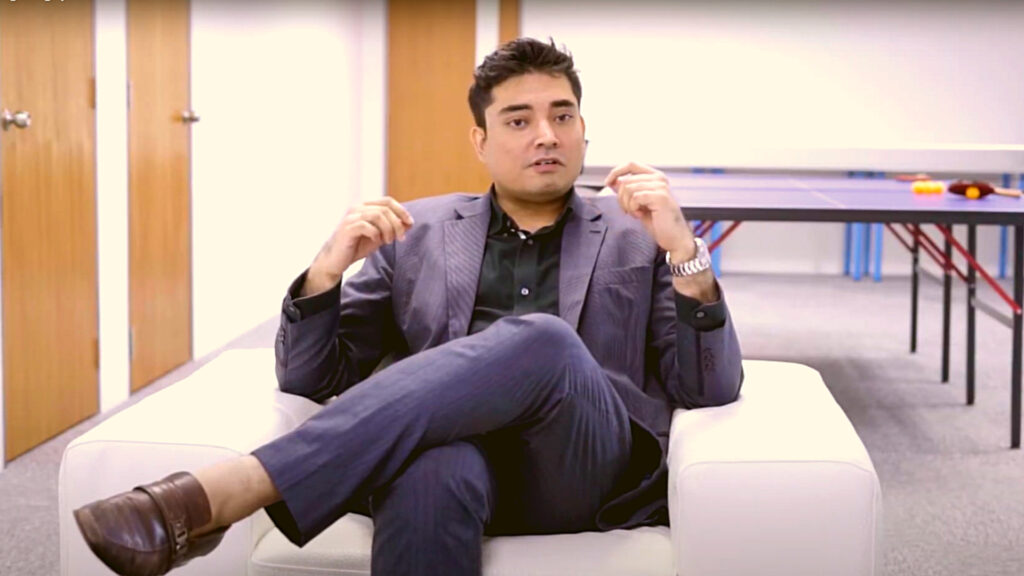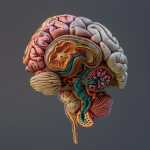In the modern age, information overload is a common problem that plagues students, professionals, and individuals alike. To combat this, memory training programs have gained popularity in recent years. Among them is the Umonics Method, developed by Sancy Suraj, a renowned memory coach and CEO of Umonics Pte Ltd. In this article, we interview Sancy Suraj to gain insights into his game-changing techniques for mastering memory.

Can you share with us some of the key techniques that you teach through the Umonics Method, and how they differ from other memory training programs?
Certainly, I would be happy to share some key techniques that we teach through the Umonics Method and how they differ from other memory training programs. Our approach at the Umonics Method is unique, as we use a holistic approach to memory training. Our program is tailored specifically for preschoolers between 3-6 years of age, and we focus on developing a strong foundation in memory techniques for lifelong learning.
One of the key techniques that we teach is the Link Method, which involves associating two items together using a vivid and memorable image. For example, if a child wants to remember to bring their hat and gloves to school, we might teach them to picture a giant hat and glove dancing together. This technique is highly effective for enhancing memory retention, as it utilizes the power of association and imagination.
Another technique that we teach is the Memory Palace, also known as the Method of Loci. This involves associating information with specific locations in a familiar place, such as a child’s bedroom or playground. This technique is highly effective for memorizing information that is sequential or ordered, such as a list of items.
What sets the Umonics Method apart from other memory training programs is our focus on a holistic approach to memory training. We not only teach memory techniques but also provide our students with opportunities to develop their emotional and social intelligence. We believe that emotional intelligence plays a vital role in memory retention, as it helps children to better manage stress and anxiety, which can interfere with learning.
In summary, our unique approach to memory training at the Umonics Method is tailored specifically for preschoolers between 3-6 years of age. Our program emphasizes a holistic approach to memory training, which includes teaching memory techniques such as the Link Method and the Memory Palace, as well as opportunities for emotional and social intelligence development.
What are some of the most common challenges that students face when learning to improve their memory, and how does the Umonics Method address these challenges?
Learning to improve one’s memory is a challenging process, and it is common for students to encounter several difficulties during this journey. One of the most common challenges that students face is a lack of interest in memory training. Many students may not see the immediate benefits of memory training or may find the training tedious and uninteresting. To address this challenge, the Umonics Method adopts a fun and engaging approach to memory training. The program incorporates games and interactive activities to make learning fun and exciting for children. By making memory training enjoyable, children are more likely to be engaged and motivated to learn.
Another challenge that students may face is a lack of confidence in their memory abilities. Many students believe that they have a poor memory and cannot improve it. The Umonics Method addresses this challenge by emphasizing the idea that memory is a skill that can be developed with practice. The program focuses on building a growth mindset in children, encouraging them to view challenges as opportunities to learn and grow. Through consistent practice and positive reinforcement, children can develop their memory abilities and build their confidence.
Lastly, students may also face challenges in retaining the information they have learned. It is not uncommon for children to forget what they have learned after a short period of time. The Umonics Method addresses this challenge by teaching children memory techniques that help them store and retrieve information more effectively. The program teaches children how to create associations and link information together to aid in recall. This technique enables children to remember and retrieve information more efficiently, leading to better retention of information.
Overall, the Umonics Method aims to address the common challenges that students face in memory training by adopting a fun and engaging approach, building a growth mindset, and teaching effective memory techniques. By doing so, the program provides children with the necessary tools and skills to improve their memory abilities and succeed in academic and personal pursuits.
How have you seen your students’ lives change as a result of mastering their memory skills, both academically and personally?
As the founder of The Umonics Method, I have witnessed many transformations in the lives of our students who have mastered their memory skills. Our program not only helps students to excel academically but also personally, giving them the confidence and ability to pursue their passions and goals.
Academically, our students have shown remarkable improvements in their test scores and grades. They are able to retain more information in a shorter amount of time, making it easier for them to keep up with their studies and excel in their exams. With improved memory skills, they can approach exams with confidence and without fear of forgetting important information. Our students have even broken world records in memory competitions, which is a testament to the effectiveness of our training program.
Personally, our students have also experienced many positive changes. With improved memory skills, they are more confident in their ability to learn and remember information, which leads to a greater sense of self-efficacy. This, in turn, translates to more confidence in their interactions with others, better communication skills, and a greater willingness to take on new challenges.
In addition, mastering their memory skills has given our students a head start in life. They have gained an advantage in their academic pursuits, allowing them to take on more advanced topics and courses. This, in turn, gives them a competitive edge when it comes to college admissions and job applications. Furthermore, the memory techniques that they have learned can be applied to many areas of their lives, including work, hobbies, and personal relationships, making them more effective in all aspects of their lives.
Overall, I am proud to say that the Umonics Method has positively impacted the lives of many students, giving them the tools they need to succeed academically and personally. Our students have gone on to achieve great things and pursue their dreams with confidence and ease.
“The transformation that occurs when students master their memory skills is truly awe-inspiring. From academic excellence to newfound self-confidence, our students experience life-changing shifts that propel them towards success. The Umonics Method empowers students to unlock their full potential and pursue their passions with unwavering confidence. It’s an honor to witness their remarkable achievements and be a part of their journey to greatness.”
How does the Umonics Method approach teaching memory skills to children with different learning styles or abilities, such as those with ADHD or dyslexia?
The Umonics Method believes that every child can benefit from memory training, regardless of their learning style or abilities. As a result, we approach teaching memory skills to children with different learning styles or abilities in a flexible and individualized manner. For example, children with ADHD or dyslexia may require more visual or kinesthetic learning techniques. Therefore, our trainers use a variety of techniques, including visual aids, games, and hands-on activities, to accommodate the different learning styles and abilities of our students.
For children with ADHD, we use techniques that incorporate movement and physical activity to keep them engaged and focused. We also structure our training sessions in shorter intervals to match their attention span, and our trainers use positive reinforcement to encourage their progress. In addition, we work closely with parents and teachers to provide additional support and strategies for these children outside of the training sessions.
For children with dyslexia, we use a variety of techniques to help them remember information. For example, we use mnemonic devices, such as acronyms or rhymes, to help them remember lists or sequences. We also encourage the use of visual aids, such as mind maps or graphic organizers, to help them organize their thoughts and ideas. Additionally, we provide strategies for improving their reading skills and comprehension, which can enhance their memory skills overall.
Overall, our approach to teaching memory skills to children with different learning styles or abilities is tailored to their unique needs. We believe that every child has the potential to benefit from memory training, and we work to create an environment that is supportive and encouraging for all of our students.
Can you share with us a success story from one of your students that illustrates the power of mastering memory skills, and how it impacted their life?
Absolutely, I would be happy to share a success story from one of our students that exemplifies the power of mastering memory skills and how it impacted their life.
One of our students, let’s call him Alex, joined The Umonics Method when he was just four years old. At that time, Alex was having trouble retaining information and found it challenging to remember what he had learned. However, after joining our program and learning various memory techniques, Alex quickly began to excel in his studies.
One of the most remarkable achievements of Alex was when he took part in a spelling competition. The competition required him to memorize 50 complex words and spell them correctly. However, with the help of the memory techniques he had learned, Alex managed to memorize all 50 words within a few days of practice. On the day of the competition, Alex spelled all the words correctly and was declared the winner of the competition.
This achievement did not just impact Alex’s academic life but also had a profound impact on his self-esteem and confidence. Alex’s parents noticed a significant change in his behavior, as he had become more confident in his abilities and had a newfound enthusiasm for learning.
Alex’s success story is just one of the many success stories we have seen in our program. It is a testament to the power of memory techniques and how they can impact a child’s life, not just academically but also in their personal growth and development.
At The Umonics Method, we believe that every child has the potential to excel and achieve their goals. Our program provides them with the tools and techniques to unlock their potential, build their confidence, and set them on a path to success.
“Unlocking the power of memory skills can transform a child’s life, opening doors to academic excellence, boosting self-esteem, and igniting a lifelong love for learning. At The Umonics Method, we are proud to witness the incredible success stories of our students as they unlock their full potential and embrace a brighter future. The impact of mastering memory skills goes beyond the classroom, shaping confident, capable individuals ready to achieve greatness in all areas of their lives.”
When asked about the key techniques taught through the Umonics Method, Suraj emphasized the importance of visual and associative memory. He stressed that the program is not just about memorizing facts but about creating a mental framework to connect and recall them. Furthermore, Suraj highlighted the uniqueness of the Umonics Method in its focus on holistic learning, combining memory techniques with mindfulness and brain training exercises to enhance cognitive performance.
In discussing the challenges that students face when learning to improve their memory, Suraj acknowledged the prevalence of distractions and the difficulty in retaining information over time. However, he explained how the Umonics Method addresses these challenges by training students to cultivate focus and retention through multi-sensory and immersive learning experiences.
Suraj shared success stories of students who have transformed their academic and personal lives through the Umonics Method. He recounted the story of a student who went from failing grades to receiving full scholarships for his tertiary education. Suraj emphasized that the Umonics Method is not just about academic success but also about improving overall cognitive performance and mental wellbeing.
When asked about teaching children with different learning styles or abilities, Suraj emphasized the importance of customizing the learning experience to suit individual needs. He noted that the Umonics Method has been successful in teaching children with ADHD and dyslexia by incorporating movement and interactive activities into the learning process.
Looking ahead, Suraj discussed the future of memory training and the Umonics Method’s plans to continue innovating in the field. He highlighted the importance of adapting to technological advancements and incorporating new research into the program’s curriculum.
Looking ahead, what do you see as the future of memory training, and how does the Umonics Method plan to continue innovating in this field?

As we continue to rely more and more on technology to help us remember information, memory training will likely become even more important in the future. People may become more aware of the need to train their memory to offset the negative effects of digital overload and information overload. The Umonics Method is well-positioned to continue innovating in this field, as it is constantly adapting and evolving to keep up with the latest research and technological advancements.
One of the key ways the Umonics Method plans to continue innovating is by incorporating more personalized and adaptive learning approaches. This could involve using technology to assess each student’s individual learning style and abilities, and tailoring the memory training program accordingly. Additionally, the Umonics Method may continue to explore new techniques and technologies for enhancing memory, such as virtual reality or brain-computer interfaces.
Another area of focus for the Umonics Method may be expanding its reach beyond traditional classroom settings. This could involve developing online courses or mobile apps that allow people to train their memory skills from anywhere in the world, at their own pace. By making memory training more accessible and convenient, the Umonics Method could help even more people unlock the full potential of their memory and achieve greater success in their personal and professional lives.
Overall, the future of memory training looks promising, and the Umonics Method is poised to continue leading the way in this field with its innovative approach to teaching and enhancing memory skills.
“As we step into the future, memory training will be a crucial tool in navigating the digital age. At The Umonics Method, we are committed to pushing the boundaries of innovation, using personalized approaches and cutting-edge technologies to unlock the full potential of memory. We strive to make memory training accessible to all, empowering individuals to excel in a world filled with information overload. The future of memory training is bright, and we are excited to continue pioneering the way forward.”
Sancy Suraj’s Umonics Method offers a unique and holistic approach to memory training that has transformed the lives of countless students and professionals. His focus on visual and associative memory, multi-sensory learning experiences, and mindfulness and brain training exercises sets the Umonics Method apart from other memory training programs. As the world continues to grapple with information overload, the Umonics Method offers a promising solution for improving cognitive performance and mental wellbeing.





























